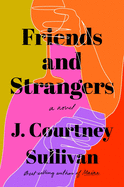
 Friends and Strangers is set in a college town in upstate New York and centers on a pair of Brooklynites who have just relocated with their baby, whose care they entrust part-time to a college student. It's fertile ground for a novel, but readers should jettison any expectation they have for the book--fish-out-of-water story, manipulative-nanny chiller, send-up of campus culture. J. Courtney Sullivan's (Saints for All Occasions) fifth novel offers something more interesting.
Friends and Strangers is set in a college town in upstate New York and centers on a pair of Brooklynites who have just relocated with their baby, whose care they entrust part-time to a college student. It's fertile ground for a novel, but readers should jettison any expectation they have for the book--fish-out-of-water story, manipulative-nanny chiller, send-up of campus culture. J. Courtney Sullivan's (Saints for All Occasions) fifth novel offers something more interesting.
The perspective in Friends and Strangers is evenly split between new mom Elisabeth Ronson and college senior Samantha O'Connell, who attends the nearby all-women's school. Sam is Elisabeth's salvation: she provides childcare three days a week, giving Elisabeth, a journalist and an author, time to work--or at least pretend to work--on the book that she owes her publisher. Sam also fills the friendship void created when Elisabeth left Brooklyn. The two women become confidantes, although Elisabeth won't tell even Sam the secret that she's keeping from her husband, Andrew. To prevent her irresponsible sister from accepting money from their wealthy but unscrupulous father, Elisabeth has lent her the cash that she and Andrew have set aside in case nothing comes of the solar-powered grill that he's working on through a fellowship at a local college.
Sam could have used that money. She's the first person in her family to attend a private college and realistically anticipates a lifetime of student loan debt. Sam is feeling the pressure to nail down her post-graduation plans: although she dreams of getting a job in New York, she's leaning toward going to London and getting hitched to a British man she met during her junior year abroad. Whereas Sam finds Elisabeth's settled life alluring, Elisabeth considers Sam "naïve enough to see marriage as an ending, an achievement, instead of the start of something so much harder and more complicated than what came before."
Friends and Strangers is about whether the unfairness of privilege can ever be sufficiently offset by good deeds. And what of bad deeds: Are they forgiven if they result from good intentions? Sam watches Elisabeth meddle without compunction, but when Sam takes a principled stance at one point, it backfires spectacularly. Sullivan massages her themes in scenes as barbed as they are funny, by way of characters as infuriating as they are heartbreaking. --Nell Beram, author and freelance writer
Shelf Talker: J. Courtney Sullivan's engrossing fifth novel covers her favorite ground--marriage, women's friendship, college life--but wraps everything in a question about the responsibilities of the privileged.

